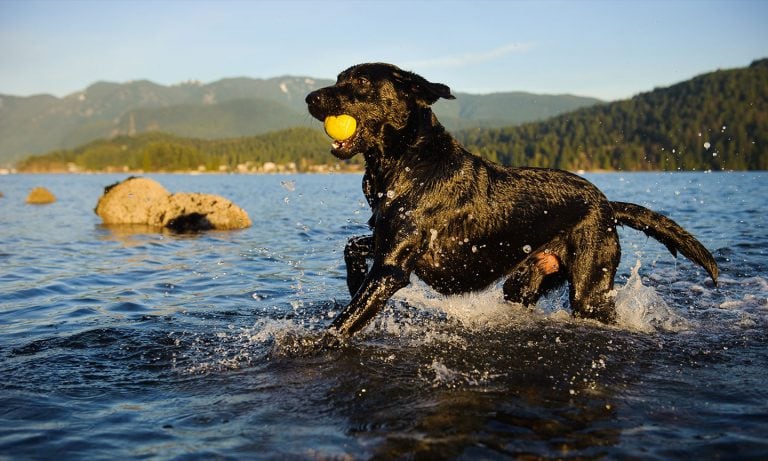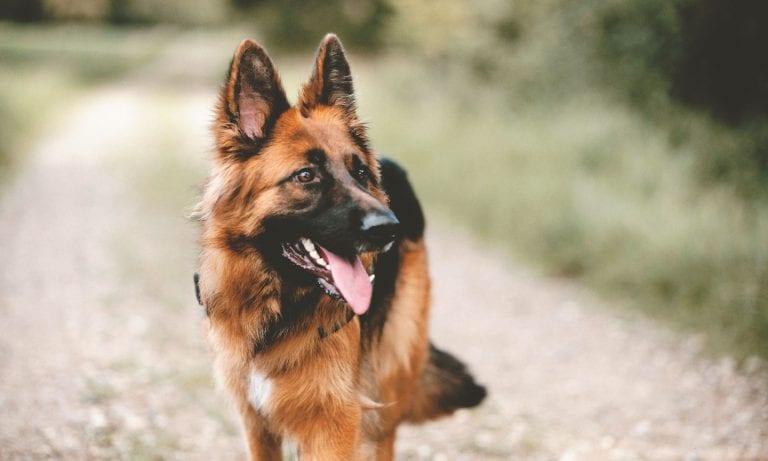Labrador Retriever vs German Shepherd

Breed Snapshot
Best For
The Labrador Retriever is one of the most popular dog breeds in America, known for their friendliness, intelligence and outgoing nature. These high-energy, athletic dogs require ample exercise and thrive in active households.
Labrador Retriever Temperament
Cheerful and animated, this large dog breed has stamina and energy to spare, able to keep up with your family and all your activities. You’ll want to funnel that energy into positive outlets, like outdoor activities and training. And thanks to their high intelligence, learning commands and tricks com...
Cheerful and animated, this large dog breed has stamina and energy to spare, able to keep up with your family and all your activities. You’ll want to funnel that energy into positive outlets, like outdoor activities and training. And thanks to their high intelligence, learning commands and tricks come relativity easy for them. Labrador dogs love having a job to do and excel at things like agility courses and, just like their name implies, retrieving items. In fact, their superior intelligence is why they often make great assistance dogs, working as therapy or service animals.
A people-pleaser, Labrador Retrievers have a pleasant personality and love interacting with humans. Get ready to be showered with lots of affection! They also easily make friends with dogs and other animals, including cats, although not all cats are as excited to meet them as they are—a Lab’s large size and high energy level can be a bit intimidating. Slow and controlled introductions to other family pets will help make the transition go smoothly. Considering the staying power of the Labrador dog breed’s popularity, it’s a safe bet your Lab will fit right in with the all the loved ones you choose to introduce into their life.
While they’re generally good-natured, like any dog breed, Labs may develop aggressive tendencies if they don’t receive proper training or have experienced abuse. Addressing any biting issues early on, providing proper socialization when they are puppies (aka safely exposing them to lots of new people, places and things) and working with a professional dog trainer can help avoid behavioral issues when they get older.
Labrador Retriever Traits

Breed Snapshot
Best For
German Shepherds, intelligent and loyal, thrive on mental challenges and active engagement. With a strong work ethic, they make exceptional working dogs. The rewarding companionship of a German Shepherd is perfect for those seeking a...
German Shepherds, intelligent and loyal, thrive on mental challenges and active engagement. With a strong work ethic, they make exceptional working dogs. The rewarding companionship of a German Shepherd is perfect for those seeking a devoted and versatile pup.
German Shepherd Temperament
The German Shepherd’s best trait is their intense, unwavering loyalty to their families. (There’s a reason they make some of the best police dogs.) The fearless breed has also been known to put themselves in harm’s way before they let a family member get hurt. Socializ...
The German Shepherd’s best trait is their intense, unwavering loyalty to their families. (There’s a reason they make some of the best police dogs.) The fearless breed has also been known to put themselves in harm’s way before they let a family member get hurt.
Socialization and training are essential for German Shepherds, to teach them that most things in this world are nothing to fear (and nothing that poses a threat to their loved ones, either). Early social interactions with kids, babies and other animals is also important if you want your German Shepherd to be well-behaved around guests. (Remember to teach children how to interact appropriately with dogs, too.) With the proper education, this easy-to-train pup can be a great family dog.
German Shepherds are born talkers. They will bark when they’re bored, and they’ll bark to alert you if something isn’t quite right. But training and exercise can help curb a lippy pup and keep their barking to when you need it the most.
These dogs are incredibly smart, and they are at their best when they have a job to do, whether working as a police or military dog, doing tracking or search and rescue, serving as a guide dog or at home practicing scent work or solving puzzles for a treat. And when they’re with their family, German Shepherds will let their silly side show as they flip their toys in the air and roll around on their backs.




